Acorns, the forgotten superfood (& how to make acorn bread)

Long have I known of the vast possibilities for ways in which one can prepare acorns but only now that I have tasted them do I understand how very important they once were to the people of this region. After cooking, their smell is similar to that of caramel and their taste something along the lines of a chestnut, but different. It awoke a distant memory in me and somehow felt familiar yet the truth is that I have never before eaten them. Not in this body anyway. Perhaps in other lives I used to eat them every day? Perhaps we all did! According to this clever lady who seems to know a lot about acorns, they used to represent 60% of our diet. And why not? They are super nutritious, they taste great and they grow in abundance on all continents.
Check out some of the different ways they can be prepared, as suggested by the clever acorn lady.

Here in the French Pyrenees I noticed recently how the oak trees have very often been planted above the canal which for the purposes of agriculture feeds most of the villages with water diverted from a river further up the mountain.
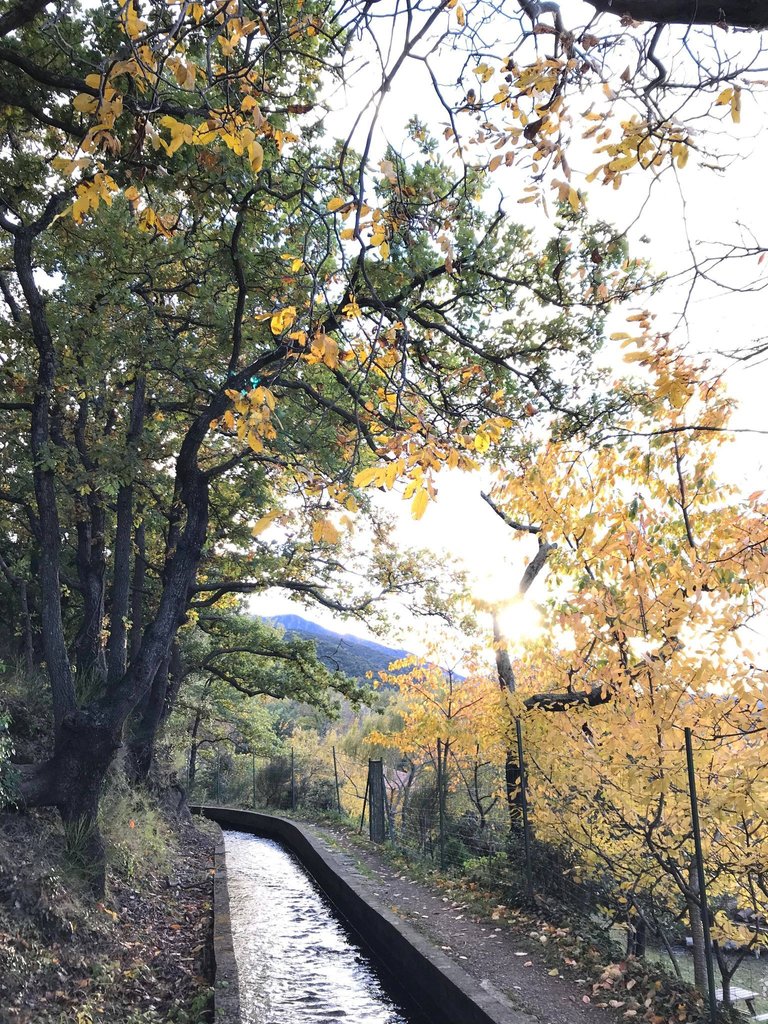
What this means is that acorns drop onto the path beside the canal at this time of year, making it impossible not to walk on them.
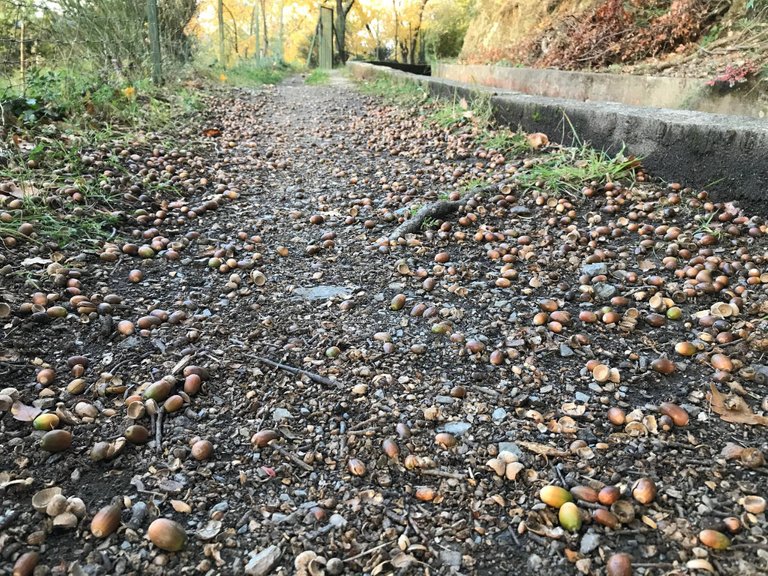
There is something about this path which seems to sum up quite well the absurdity of our so called 'advanced' society. So advanced that instead of eating the free, abundant & nutritious food which grows all around us and drops conveniently at our feet, we walk on it until it has been trampled into the mud. What must those poor trees think of us? I know they don't 'think' in the conventional sense of the word but I believe they do feel what is happening around them (clearly demonstrated by the phenomena known as singing plants) and in particular they can sense what is happening to the seeds they offer us each year. So in this moment they are smiling at me, pleased that one person here has finally remembered how acorns are so much more than just nuts for squirrels!
Prior to this moment I actually took a relative amount of pleasure from the sensation of squashing them under my feet (sorry trees) but that will not be possible any more.
Acorns also by the way lend themselves perfectly to long term storage due to the tannin which acts as a natural preservative, so unprepared (and dry) they will last as long as ten years.
The canal itself fills up with them at this time of year. The ones with worms tend to have a little air in them so they float away, while the good ones sink to the bottom.
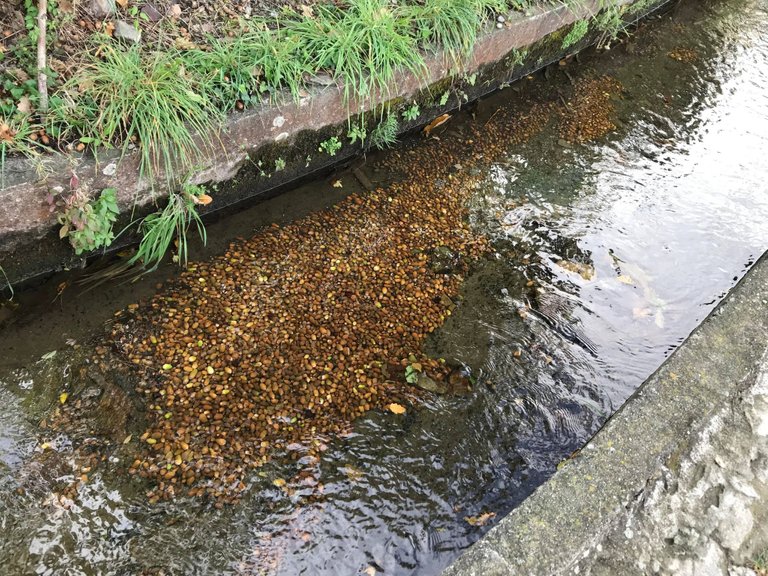
Watching them in the water over the last month I observed how they started to open after time and it suddenly dawned on me these oak trees were not planted here by chance!
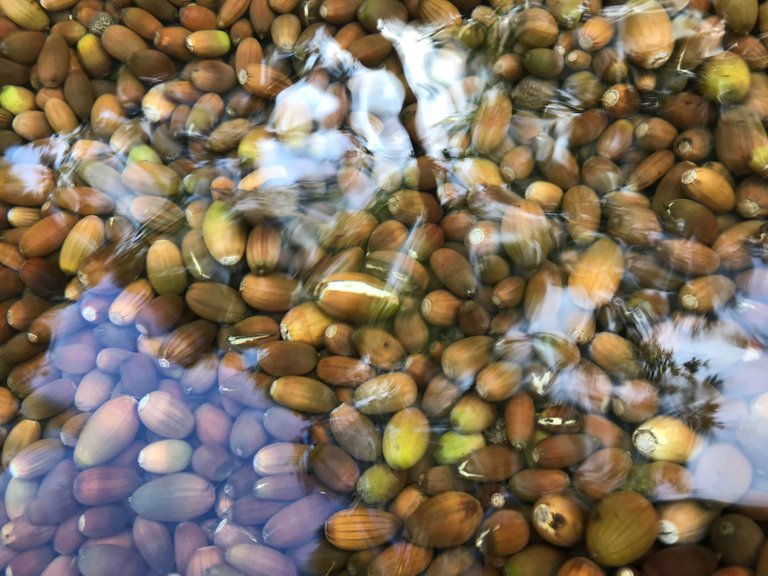
In fact, by sitting in the cold & constantly changing water of the canal, the acorns were undergoing the exact process they needed to rid them of their bitter tasting tannin. So I believe these trees were planted here with intention, but it has been many decades now since the people of these villages understood what to do at this time of year. I could even imagine how in the past it would have been someone's job to gently push the acorns off the path into the canal where after a month of 'processing' they would have been collected up and handed out to the village.
Quickly inspired by my observation, I collected a ton of the best looking acorns I could find from the edges of the path. I did not collect the ones from the canal because thanks to that wonderfully advanced world of ours, the farmers up the mountain use chemical pesticides & fertilisers which seep into the canal water, making it undrinkable and therefore rendering the simple & effective methods of our forefathers unusable.
I put my collected nuts in water to identify the ones with air/worms and slapped the remainder down on my kitchen table, ready to work.
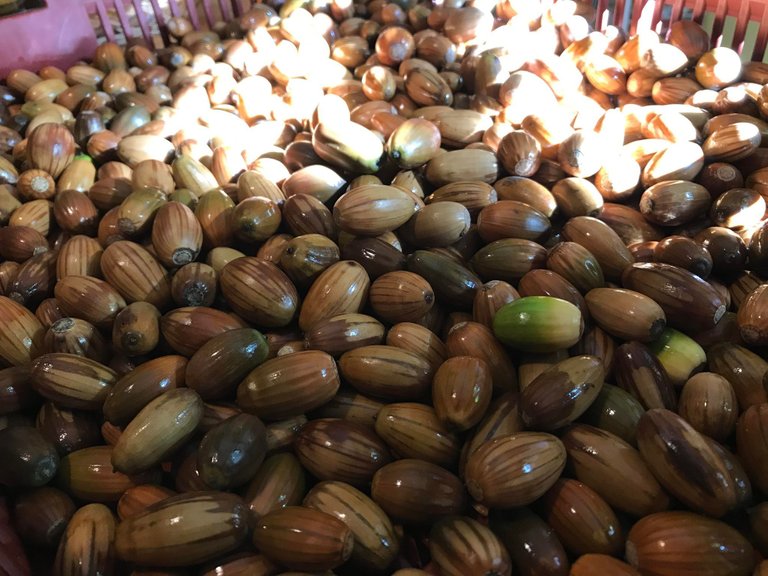
Couldn't find a hammer so I used this wooden lemon squeezer to whack each one before peeling away the shells.
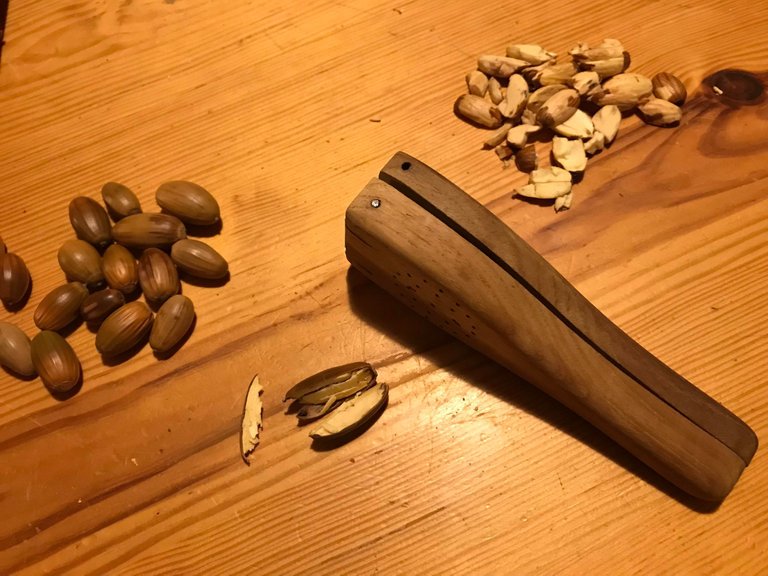
Had I been able to use the acorns from the canal the shells would have fallen away easily, but instead it was a long and laborious process so if anyone knows of a way to shell acorns on mass I would be interested to learn it! That being said, I could imagine a bunch of people sitting together for a day to get this job done being both effective and fun.
The cold water processing method takes around a week, changing the water every time it gets cloudy, which is basically two or three times a day. By cutting them up into smaller pieces the process is sped up.
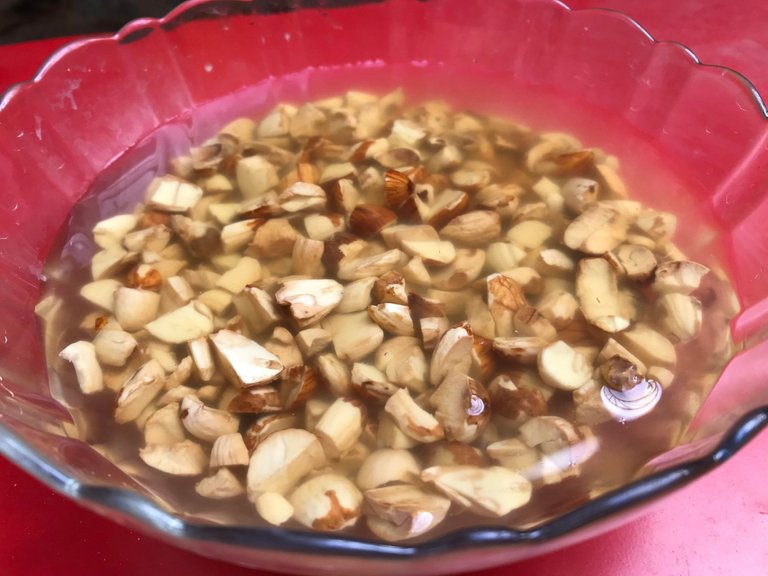
The hot water method permits one to eat them immediately. Just boil a full kettle of water adding a little bit to your acorns. Bring to the boil on the stove and discard the water when it becomes cloudy, replacing it with more boiling water from the kettle. Repeat this process till the water remains clear even after a few mins of boiling. For me all of this took around 15 mins.
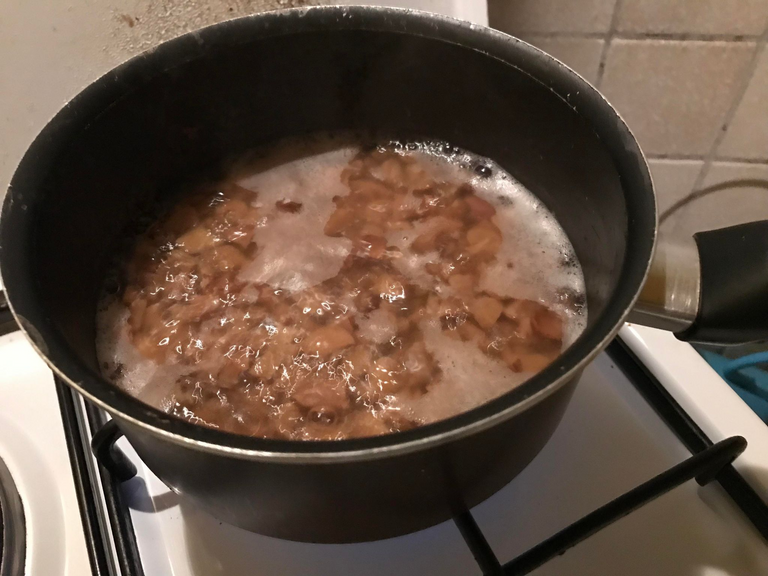
The process changed their colour a little and I can see now why the interior of acorns are referred to as meat.
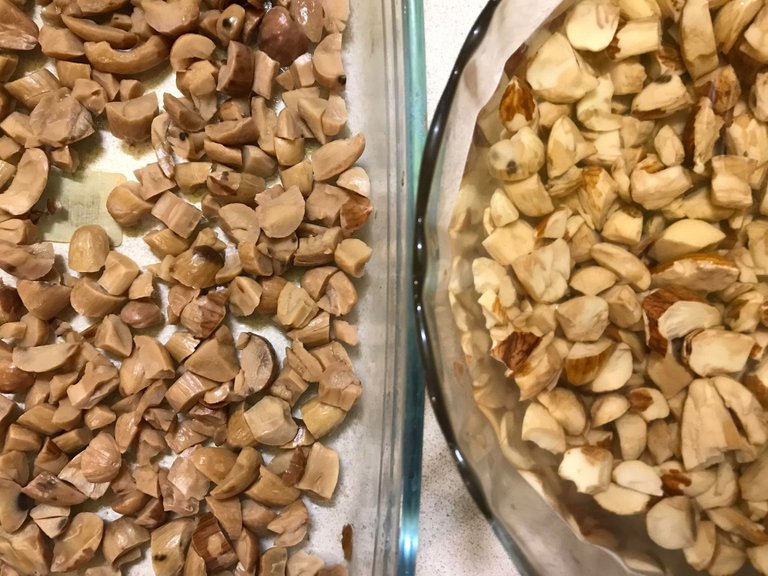
The above comparison shows hot processed acorn meat alongside the cold processing batch.
I left the hot batch to dry overnight and put them in the food processor in the morning for a few mins. And there we have it!
Acorn flour.
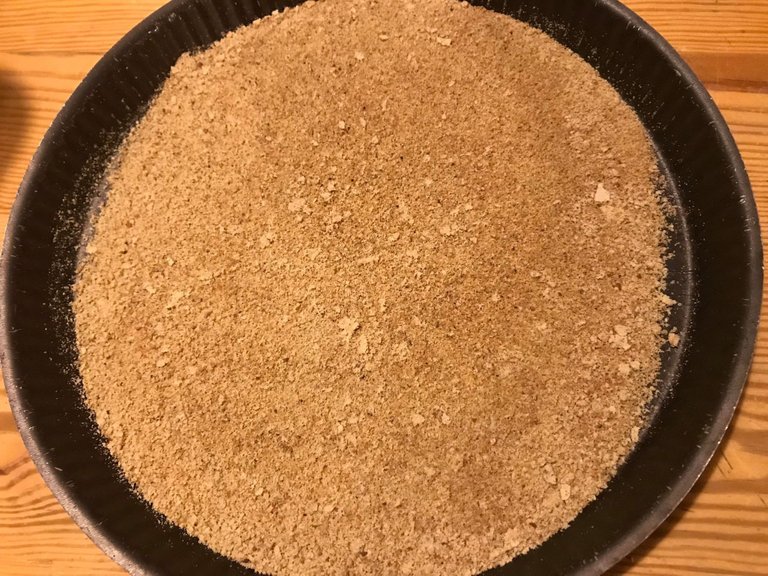
If I intended to store this flour I would have dried it further and processed it again to make it finer, but keen to add this to my daily bread mix as it was, I did not process beyond this.
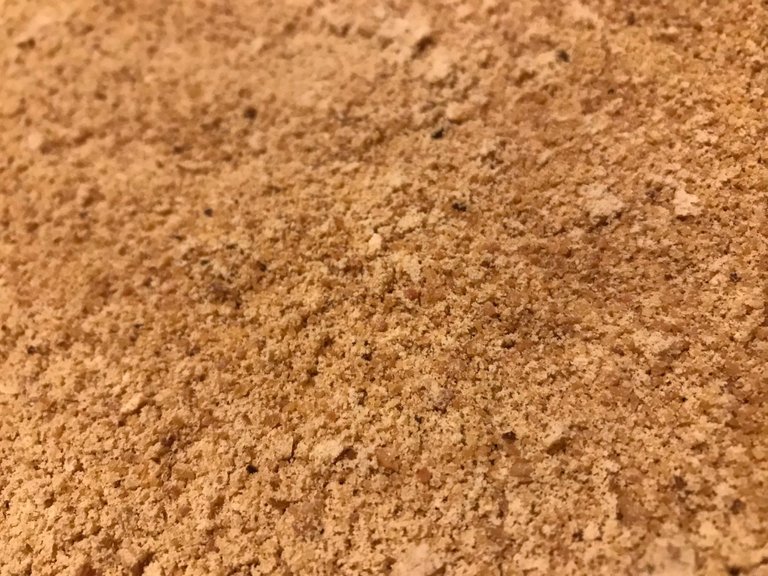
Bread time
Thanks to the actions of @sauna who sent me some sourdough starter from Canada last year (how you doing buddy?) I have been making bread regularly this year and enjoying it very much. However, with the price of flour on the rise and serious shortages looming on the horizon I am keen to find alternatives which are not only free and abundant but most importantly acceptable to the palates of my very picky family!
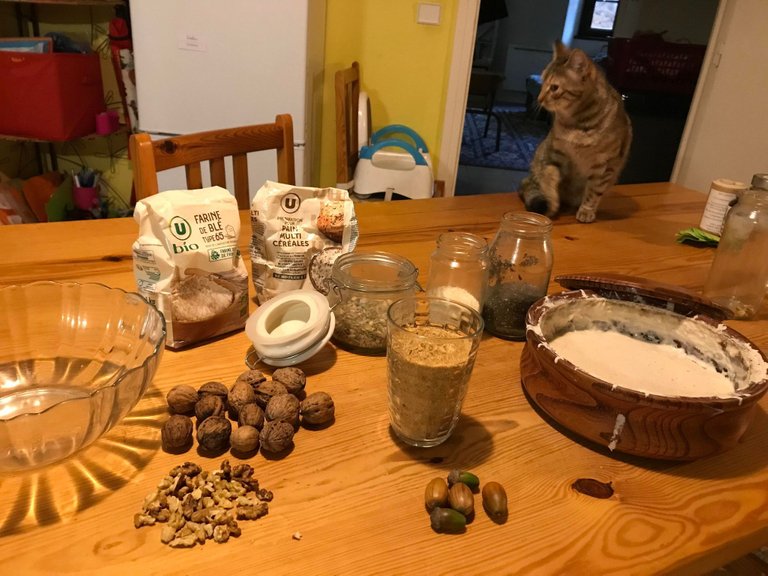
Here you can see all the ingredients I normally use, plus one cup of acorn flour.
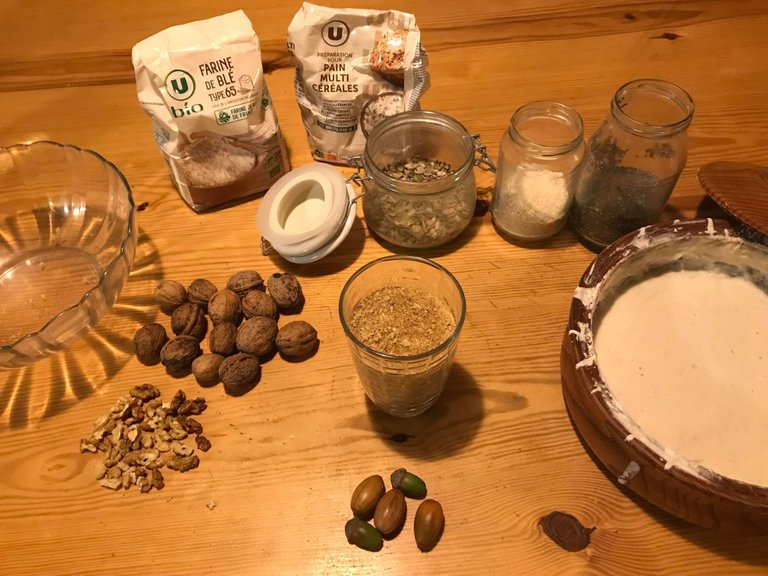
The first thing into the mix is always the sourdough starter which is then fed with more four and left to rest for a few hours before going back in the fridge.
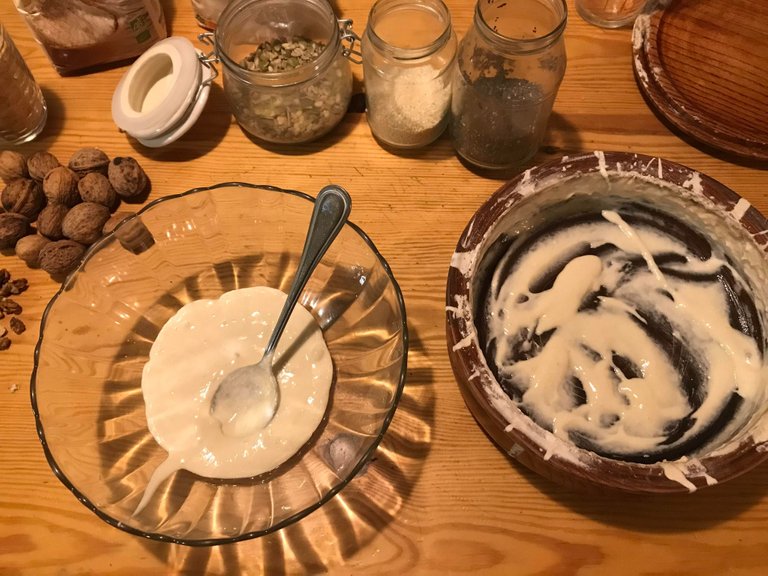
Here you can see the acorn flour along with my usual combination of type 65 (relatively white) & a little multi grain.
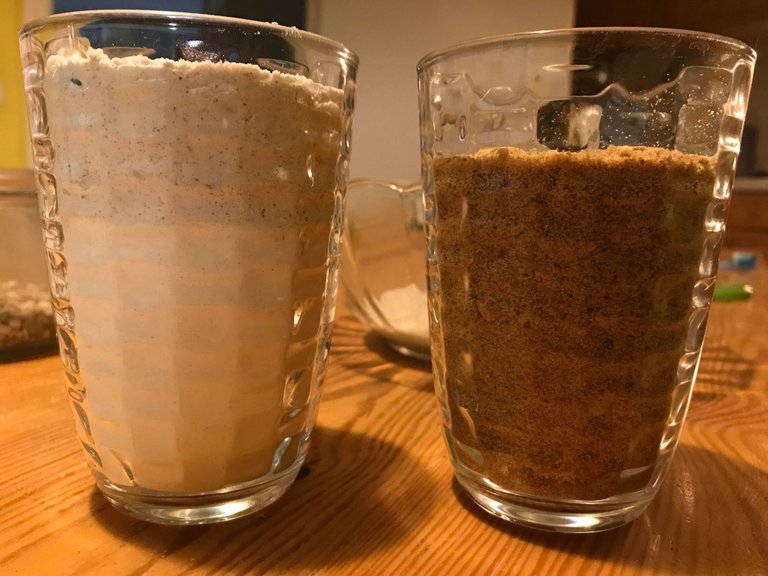
Into the bowl everything goes, making sure to add a healthy mix of walnuts (from our garden) and seeds from local shops. I usually add sunflower, pumpkin, pine nuts, poppy seeds, sesame & flax.
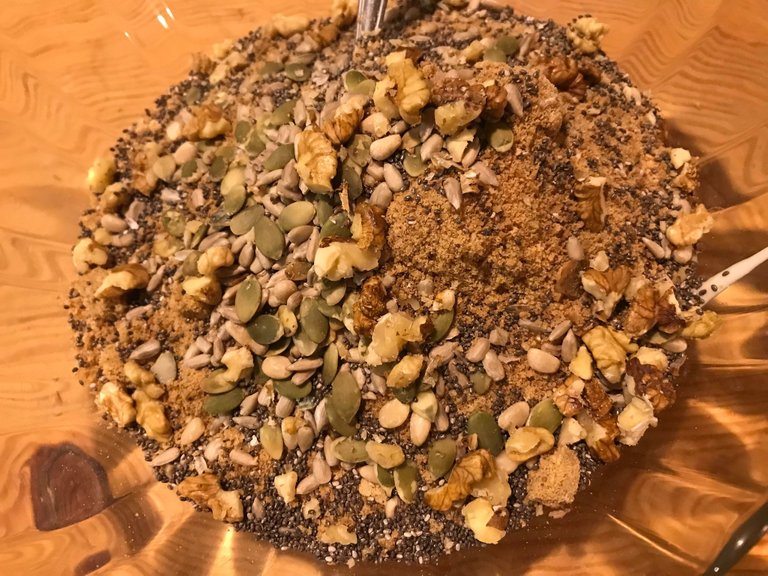
After adding water and working the dough into a ball, I cover it and leave here for around six hours.
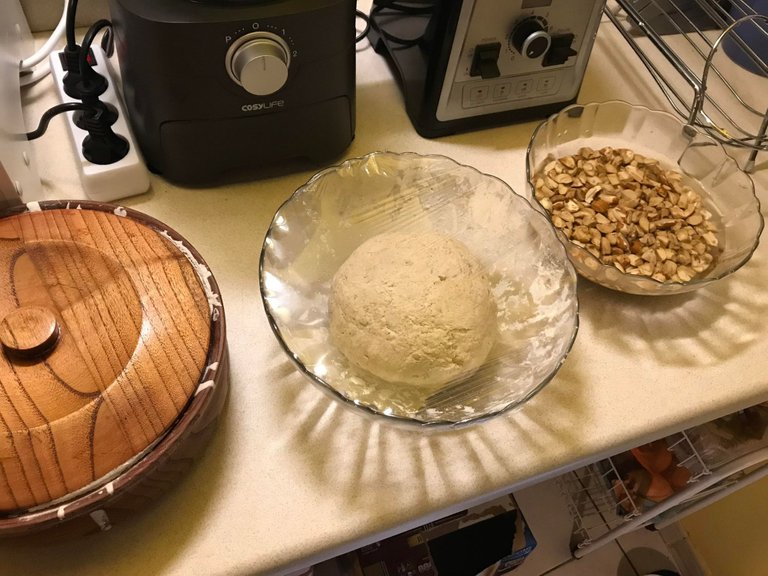
For the next stage I add salt (dissolved in a little water) and work the dough again before resting it in a greased & floured baking dish for three hours. Just before baking I add some extra seeds & nuts and cut some grooves in the top for style.
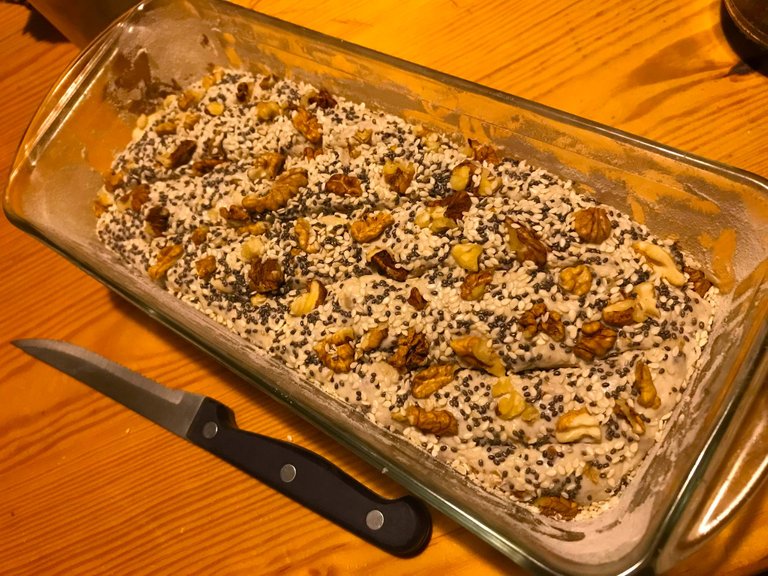
The bread is covered for the first part of the baking process (25 mins at 220°C) and only for the last 10 mins is it uncovered to toast the top bit to perfection.

Roasted walnuts are of course a little bit special!
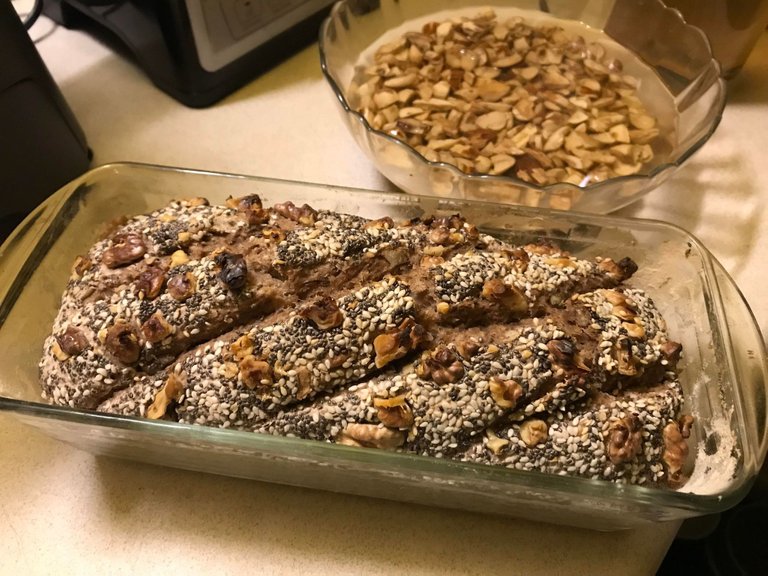
The bread must be removed from the baking dish immediately and left to cool in a way which permits airflow all around it. Sit it directly on the table and the base will go soggy.
I was super excited to cut into it once cool!
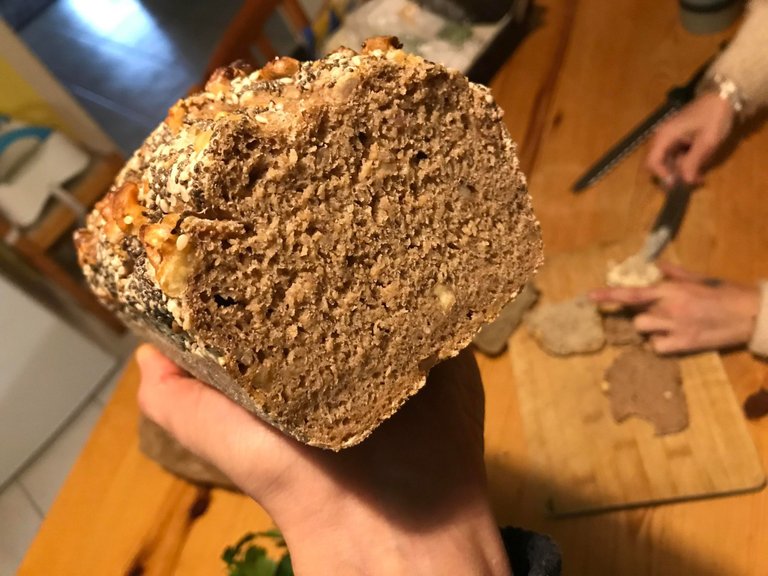
The consistency was perhaps a little thicker than usual and I observed how it may have needed longer than three hours to rise once the salt had been added.
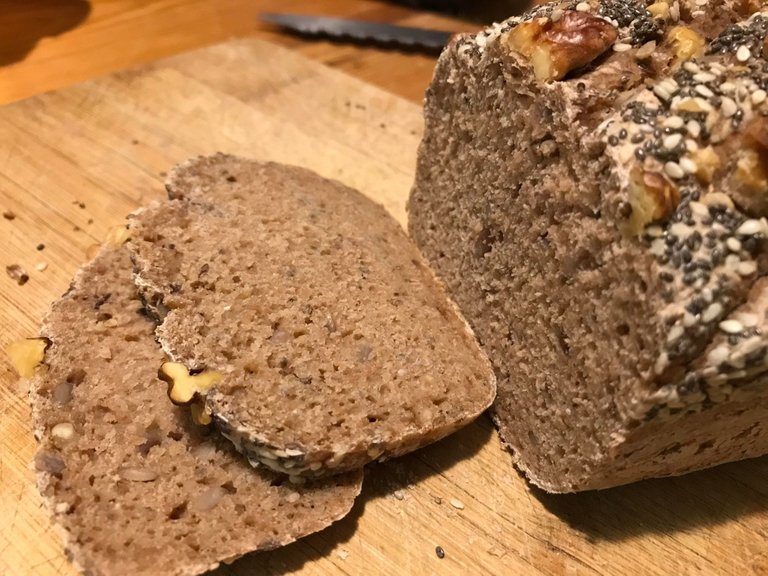
The colour was quite unique, a cross between red & orange, more easily seen when compared to the remainder of my previous loaf.
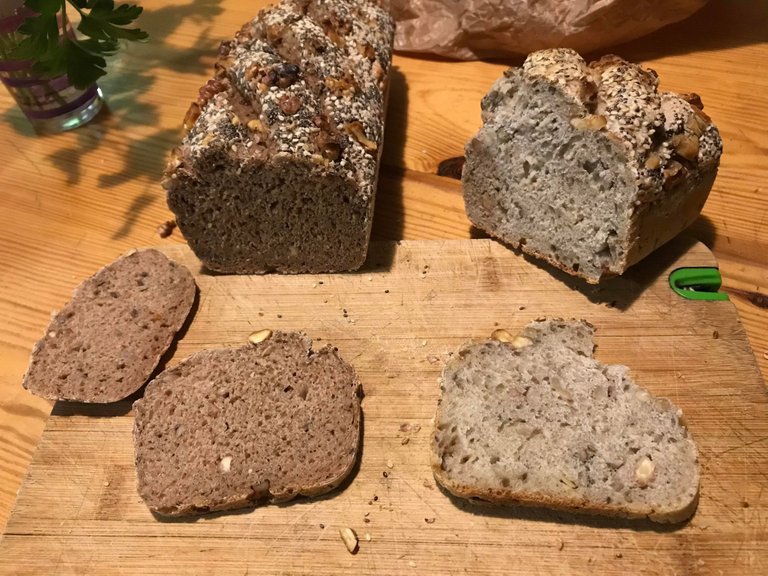
Upon tasting I discovered it wasn't all that different from normal! This was unexpected. The kids (who are the acid test) ate it without hesitation for breakfast, which is really great news! But ever curious to push further, I want now to taste a loaf which is 100% acorn, just to capture that unique flavour which is barely detectable in a 50/50 mix. Perhaps I have already reached the moment in my life when I can throw out the GMO corn flours which hold very little nutrients to replace them once and for all with an organic, sustainable and nutrient packed alternative?
Now wouldn't that be something!
Love & Light everyone 🌱
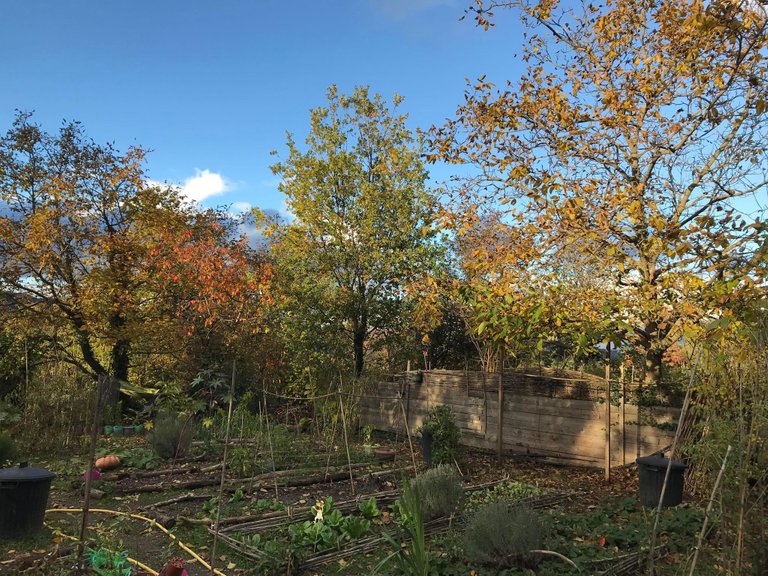
I think it's great how you can make use of what mother nature offers us and turn bit into a meal, and more importantly it gets the thumbs up from the kids!!
Walking down that path every day it was actually impossible to ignore them! I just followed the flow of my thoughts from there. And yes, it's a big victory when the kids eat it! Super happy about that :)
fascinating! I'm not sure I've ever even heard of eating acorns before...
Well, now you have ;) Please spread the word. This could actually save lives when times get testing.
Wow! I am in awe. Everything around us can be useful, especially if we make use of it in many ways. It’s like magic.
It is like magic isn't it. Everything pieces together so perfectly when it is permitted. I would even go as far as to say there has been a concerted effort to disconnect us from such things. But those days are coming to an end.
Yes, I totally agree with you. Thank you for sharing. Keep it up. 🤗
I had no idea acorns were edible. We have a park around the corner filled with acorns and I've watched the local squirrels feast on them around this time of year. I've often wondered if they were fit for human consumption. Great post, this was really informative.
It is a funny old world we live in hey, when the squirrels know better than us what to do with acorns ;)
Am pleased you found it informative. It feels to me as if this information could save lives in the future.
Funny, I was kind of thinking the same thing as I read it. My exact thoughts were, this is good to know and could come in real handy in an emergency.
Whoa - very interesting and looks like you learn something new every day Sam. How very sad that the canal waters have been contaminated. Congrats on this find.
I certainly try to learn something new every day! Hard not to when one spends a decent amount of time outdoors with their eyes and their mind open ;)
How true - what a wonderful and blessed lifestyle you have Sam😃
Haha. Excellent.
Feel ya.
Whenever I see acorns, I instantly think food. I know they are bitter, but I also know that if they're treated right they can be made into something delicious and healthy. Looks delicious! Next time I find acorns, maybe I'll try making some bread out of it! INSPIRATION!
Hello there! I had a memory of you asking about acorns a long time ago so am pleased you caught this one. Yes, like you I will never again be able to look at them as anything other than food and this time of year will always be that much more enjoyable as a result! And full of nutrition ;)
Hope you are able to try out the acorn bread. Even just eating the cooked nuts (sprinkled with a little salt) is wonderful!
100% It is aggravating for me to see good food wasted. There are so many untapped resources that are neglected simply because we think "food" is only what you see on display at the supermarket.
Exactly right. So many untapped resources. Discovering them is the tricky bit when there are so few people left who know what to do. But (re)discover them we will!
Flushing them like that should work and was probably practiced back in the day.
Another method is to just pick the ones from one year earlier.
They lose their bitterness over time.
Even most animals who love acorns will not eat them, when they are too fresh.
Wow! Didn't know this. Many thanks for the info.
I can hear the wild pigs at night sometimes and I was imagining they were eating the acorns, but it could also be the mushrooms perhaps. Do squirrels eat them right away? Perhaps they store them away and only eat their nuts from the previous year? Need to look into that...
Many thanks again!
When I was a child, I would pick buckets full of acorns for a local type of zoo.
I was always disappointed to see the hogs go to town on the old, dark, rotten acorns instead of my clean, green, fresh ones.
It was only later when I got into survival skills that I realized, why they would do this.
Also: I am not an acorn connocieur, but I think there are quite some differences between the varieties.
Like you mention in the op: We lost some knowledge there. People back in the day knew these things.
Thanks for the follow!
Now that I have your attention, can I interest you in joining my maize challenge 2022?
https://peakd.com/mc2022/@felixxx/1000-hbd-prizes-maize-challenge-2022
After watching much of hivefest I imagined you were referring to some kind of NFT project like hashkings! Happy to see you are in fact growing physical food :) And it is fortuitous that you should mention this plant in particular because we've had two seasons of healthy yet inedible maize which is a mystery I would very much like to get to the bottom of.
Is there not a difference between maize & corn? I seem to remember in the UK a lot of maize is grown but it is for the animals due to a tougher consistency which is less enjoyable than corn. I mention this because here in France there is only one word to describe these plants... "maïs".
So I bought some maize and I appear to be able to grow it quite successfully but as I mentioned, it is not soft and enjoyable at the end! And I am wondering if I am not growing maize for animals? Do you happen to know of a way to tell the difference?
In German it is 'Mais'... and 'Korn' means any kind of grain.
English is weird sometimes.
Yes there are different varieties and the one you think of is sweet corn.
Sweet corn has a certain mutation, which makes it sugary and juicy.
98% of maize is not the sweet, juicy kind; There are varieties for grinding into corn flour, for animal feed and some are best just for bio-fuel.
I will be growing Golden Bantam sweet corn, which is by far the most popular sweet variety.
Just by looking at a plant or a seed, I would not be able to tell whether it's sweet corn or popcorn genome, but the products are very different. (edit: thought about it some and could probably tell the seeds apart)
I do know that most South Americans and most Africans will not be growing sweet corn for my challenge. Most of them do not even seem to like sweet corn :D
...and all this is exactly why I want to see this challenge succeed - So much to learn from each other!
Awesome you learn something new everyday.

Really enjoyed your post thanks for sharing
@samstonehill
Hey brother! Thank you for the big colourful thank you ;)
You are most welcome @samstonehill loved the post recently been getting into natural medicine food and drink.

For me it all started with herbal tea.
Have the best day
You have become quite the ( bread ) chef, mon ami!
I was literally walking through the forest, days ago, and wondering whether the acorns - that were crackling underneath my feet were edible. I even picked one up, opened it and took a bite ( wondering how this must taste for a squirrel ) and now I read this...
Amazing!
Am getting there with my bread making. I have the habit of falling into routines with things and then not pushing further to learn more. For the bread I definitely have my routine now and am conscious of there being numerous different ways one can prepare the dough which are more enjoyable to the palate. These other techniques all take time however! So for now they remain illusive to me, but I am certainly enjoying the journey ;)
Hope you picked some of those acorns! I rushed to get this post out knowing that many of us are enjoying squishing them under our feet at this time of year. Let's see if hive enjoys some more acorn related posts over these next few weeks...
Love this post! I knew acorns were nutritious, but had been under the impression they were labor intensive to process. There's some time and such involved, but it's much simpler than I thought.
Do you know what species of oak you used? I have a enormous white oak here that often has thousands of acorns.
Feel like it would be a lot less labor intensive if I could only find some way of crushing them all quickly. I might try putting them between some pieces of wood and jumping on them today...
No idea what variety I am dealing with here. A number of different ones it appears. I would imagine all varieties are edible, just different with their processing times, but will definitely push further to discover what varieties we have.